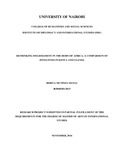| dc.description.abstract | Kenya and Uganda have had to grapple with insecurity challenges stemming from proliferation of illicit Small Arms and Light Weapons (SALW). The situation is worse among pastoral communities who illegally possess illicit arms in large amounts. Consequently, the two countries have pursued various disarmament initiatives in order to curb the spread of illicit arms. Nevertheless illicit SALWs continue to proliferate and to be misused to launch violent attacks and commit various crimes. This study looked small arms proliferation and disarmament at the Horn of Africa in general and Kenya and Uganda in particular. It focused more on disarmament of pastoral communities at the Kenya Uganda boarder and compared two major disarmament initiatives by Kenya and Uganda namely: The Karamoja Integrated Disarmament and Development Programme (KIDDP) in Uganda and Operation Dumisha Amani (ODA) in Kenya.
The persistence of the small arms challenge even after KIDDP and Operation Dumisha Amani puts to question the effectiveness of disarmament in the two countries. As a result the study maintained that for effectiveness disarmament required a rethink. The study proposed a human needs perspective and a human security approach to disarmament. The main area of focus was the Kenya Uganda boarder particularly the Karamoja region of Uganda and Turkana and West Pokot counties in Kenya. The target population comprised of the Karimojong in Karamoja, Uganda and the Pokot and Turkana in Kenya. It was a comparative study that relied on both primary and secondary data and applied qualitative data analysis methods. Based on the analysis of data collected from the study area, the study concluded that disarmament is urgent and indispensable in both Kenya and Uganda.
In rethinking disarmament, security ought to be provided as basic human need for disarmament to work. Security in this case should be considered in all its aspects from a human security perspective which considers the economic, personal, health, physical, cultural aspect of security as well as environmental security. Disarmament that adopts a human security approach would be effective in that it would enhance security in its entirety thus ensuring that communities attain freedom from fear and freedom from want, avert direct and structural violence. It is a long term process that would eventually curb the demand for and curtail the supply of small arms and light weapons. | en_US |



